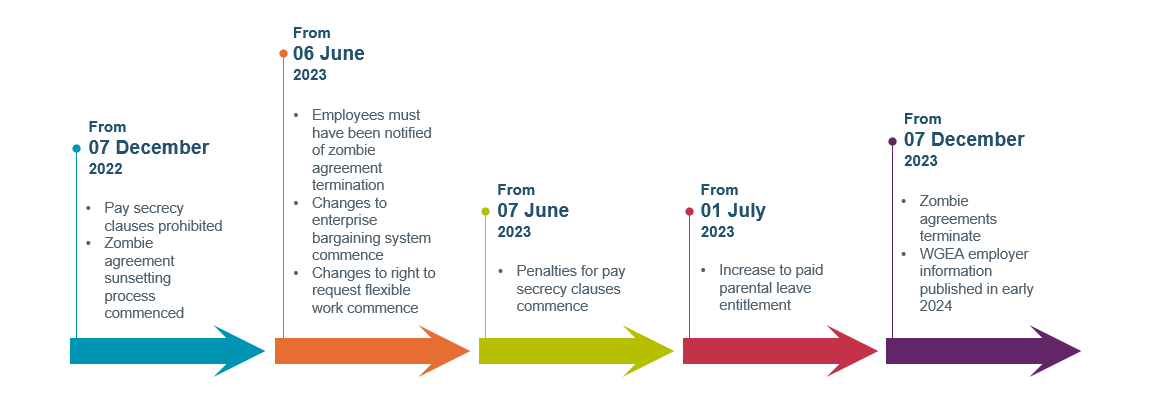Fair Work Act Changes - Important Changes Approaching
In our recent alert, we set out some of the key upcoming changes in Australian employment law.
Since then, there has been further progression as the Labor Government implements its workplace agenda. We have set out a timeline for the year ahead and steps that businesses should be taking now. 6 and 7 June loom as key dates for employers.
Enterprise Bargaining
'Zombie Agreements'
Employers who have 'zombie agreements' (i.e. agreements made before modern awards commenced on 1 January 2010) must notify affected employees in writing that:
- They are covered by a zombie agreement;
- The zombie agreement will terminate on 7 December 2023 (unless an extension application is made to extend the default period); and
- The sunsetting process commenced on 7 December 2022.
This notification must be given to employees by 6 June 2023.
Changes to Enterprise Bargaining System
From 6 June 2023, changes to the enterprise bargaining system come into place. This includes:
- The introduction of multi-employer bargaining under three streams, being:
- Cooperative bargaining (voluntary only);
- Supported bargaining (voluntary or involuntary); and
- Single interest employer (SIE) authorisations (voluntary or involuntary, including where an employer can be involuntarily roped into an existing SIE agreement).
Employers cannot be included in an SIE authorisation, or added to an existing SIE agreement, if the employer and employees are: - Covered by a current enterprise agreement that has not yet passed its nominal expiry date; or
- If the employer has agreed in writing with a union to bargain for a replacement single-enterprise agreement.
A union can ask the Commission to make an SIE authorisation covering the employer if there is no agreement in place or in contemplation. Unions will also be able to request the Commission add an employer to the coverage of an existing SIE agreement.
- The introduction of a new mechanism to help break deadlocks in enterprise bargaining.
The Commission will be empowered to arbitrate an outcome if it is reasonable and when one of the following circumstances exists:- The Commission has previously exercised its powers to deal with the dispute (for example, through section 240 of the Fair Work Act 2009);
- It has been nine months since the previous agreement expired or since bargaining started; or
- There is no reasonable prospect of agreement being reached without an intractable bargaining declaration.
The Commission may make an intractable bargaining declaration, which then results in structured processes to facilitate further negotiations, arbitrate disputes and make workplace determinations.
Changes to flexible Work
A number of changes will be made to the National Employment Standards right to request flexible work. This includes:
- More employees being eligible to request a flexible working arrangement, including pregnant employees or employees (or their immediate family member) experiencing family or domestic violence;
- A greater requirement to engage and consult with employees before refusing a request for flexible working arrangements; and
- Power for the Commission to conciliate and arbitrate disputes about requests for flexible working arrangements.
These changes come into effect on 6 June 2023.
Pay Secrecy Civil Penalties
Pay secrecy clauses, which operate to prevent employees from disclosing their salary, bonuses and other financial incentives, have been prohibited since 7 December 2022.
There is the potential for civil penalties if:
- An employment contract (or contract variation) is entered into on / after 7 December 2022; and
- It is inconsistent with the new ‘pay secrecy’ workplace rights; and
- It is not varied to remove that inconsistency before 7 June 2023.
Employers could be exposed to civil penalties of up to AU$66,000 per contravention.
Prior to 7 June 2023 it is important to review any employment contracts and confidentiality agreements entered into or varied after 7 December 2022 to confirm no pay secrecy provisions exist. Template letters for mid-year salary reviews or bonuses should also be considered to make sure these do not contain wording which may offend the pay secrecy prohibitions.
Flexible Paid Parental Leave Days
Currently, employees are entitled to up to 18 weeks of government funded paid parental leave for a child born or adopted before 1 July 2023. Only six weeks of the paid leave can be taken flexibly - the balance 12 weeks must be taken as a single block of leave. Dads / Partners are entitled to two weeks of paid leave.
From 1 July 2023, the entitlements for both parents have been combined to provide for 20 weeks paid leave to be shared between both parents in a way that suits the needs to the family. The 20 weeks can be taken flexibly and the requirement to take a 12-week block has been removed.
This change applies for children born or adopted after 1 July 2023 and the leave must be used before the child turns two. Single parents are eligible to access 20 weeks of government funded paid leave.
Employers who provide additional parental leave entitlements should consider how the amendments interact with existing policies. Staff with management responsibilities of employees taking parental leave should also be informed of the changes and encourage discussion with employees around how they may intend to access the parental leave entitlements.
Workplace Gender Equality Amendment (Closing the Gender Pay Gap)
We last reported that the Workplace Gender Equality Amendment (Closing the Gender Gap) Bill 2023 was introduced into Parliament on 8 February 2023. This Bill has now passed both houses, and received Royal Assent on 11 April 2023.
Employers with at least 100 employees have previously been required to provide a report to the Workplace Gender Equality Agency (WGEA) across six indicators - including gender pay equity, gender composition, workplace sexual harassment, recruitment and promotion, gendered work segregation and leave and flexibility.
As a result of the recent changes, the WGEA will now publish information received from individual employers (where previously, this information has been disclosed by WGEA on an industry-wide, anonymised basis).
The first period that this is applicable to relevant employers (which are not Commonwealth sector employers) is the period between 1 April 2022 and 31 March 2023. This information will be published in early 2024 and will be available for public viewing on the WGEA website.
WGEA will publish the second round of information in late 2024 or early 2025, which will include Commonwealth sector employers.
Looking Ahead
Industrial relations changes continue to take effect and there are more changes on the way with further legislation currently before parliament. Consultation processes are underway to review labour-hire regulation, extend the Commission's power to regulate 'employment-like' arrangements, further strengthen prohibitions on wage theft and develop 'Same Job, Same Pay' legislation.
We can expect significant change to workplace regulation in the coming 12-24 months as a result.
We will keep you updated but if you have any queries regarding these changes, and the effects they have on your organisation, please contact us.
This publication/newsletter is for informational purposes and does not contain or convey legal advice. The information herein should not be used or relied upon in regard to any particular facts or circumstances without first consulting a lawyer. Any views expressed herein are those of the author(s) and not necessarily those of the law firm's clients.







